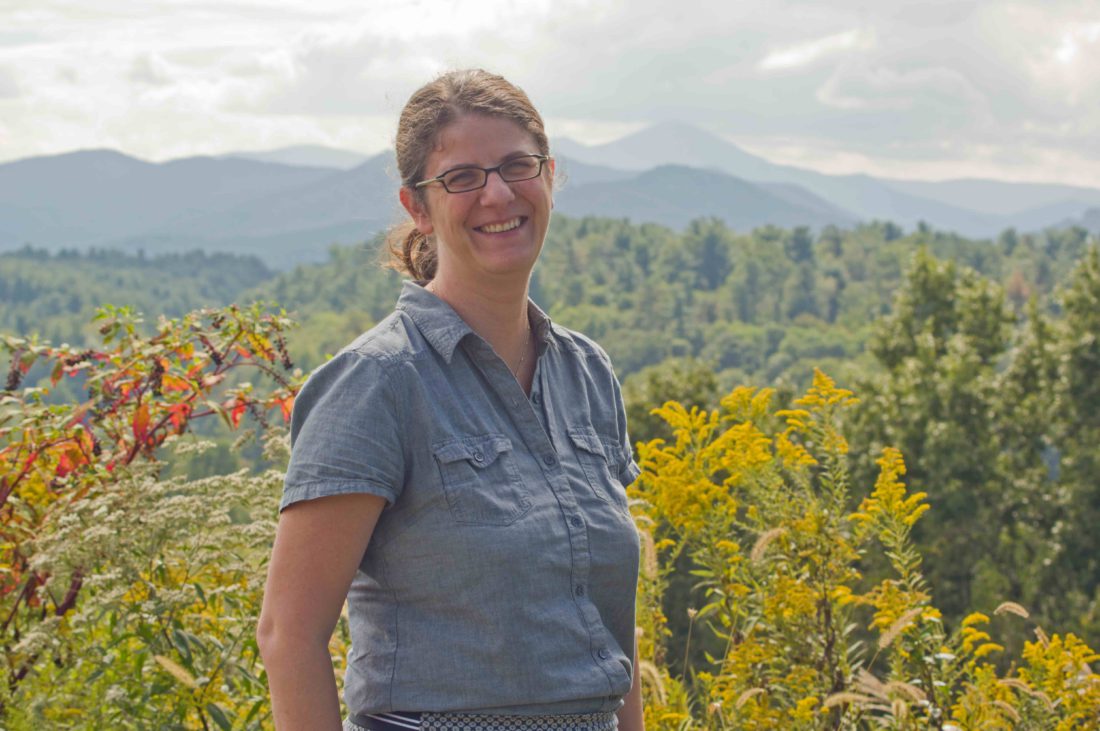Art for art’s sake has inspired artists to create for centuries. But local artist and self-identified witch Liz Watkin takes a different approach, engaging in the creative process as a tool for spiritual development. Her recently established collective Open Coven invites people to come together to explore visual art and crafts as a devotional practice.
“A creative space is a sacred space,” says Watkin, an e-learning specialist who started the collective last winter. “The mission of Open Coven,” according to the organization’s website, “is to help people find their own magic and spiritual emancipation by fostering creativity and inner guidance.” Open Coven hosts a number of creative classes this fall, such as Art Magick for Witches at the Unitarian Universalist Fellowship of Hendersonville on Saturday, Oct. 6; and the Air installment of the Elemental Art Magick Workshop Series, held at the Burton Street Peace Gardens on Sunday, Oct. 7.
The term “magic,” as Watkin uses it, emerges from the Wiccan tradition — an earth-based, pre-Christian religion whose practitioners are called witches or pagans, says Watkin. Magic, she continues, refers to human agency: The ability to make changes in one’s life through spiritual practices. Magic is experienced differently by different people, she notes, but it helps contribute to wellness and self-esteem. Watkin makes it clear that she is not an art therapist, though she says the process of creating art can be healing.
A coven, Watkin explains, often refers to a closed group of people practicing Wicca, but she decided to marry the words “open” and “coven” to be “inclusive … so people can empower themselves.”
Open Coven is not limited to witches or pagans, she says, but is for anyone wishing to use art to tap into the power of intuition and the guidance of the subconscious. Open Coven has attracted “a lot of people who are creatively blocked but are willing to pick up a paintbrush,” as well as many politically charged people who are interested in the intersection of art, witchcraft and activism, Watkin says.
Although not formally trained as an artist, Watkin has worked over the years in a variety of visual arts and crafts media, including collage, design, painting, illustration and quilting. Art journaling has become a major focus of her work since her husband gave her a book about it last Christmas. “I radiated toward it because it’s different from what other people are doing,” she says.
Art journaling, Watkin explains, involves making art in a book that is intended only for oneself. “It’s quite liberating,” she says. “You can use it as meditation and internal exploration.” Watkin has designed an online art-journaling course that includes videos, printable articles, exercises and rituals.
One offline workshop, held recently at Asheville Raven & Crone, involved automatic drawing — “allowing your hand to make shapes without a plan,” Watkin explains. “You’re not so dependent on language in developing a story from them.”
Watkin maintains a blog and an online store that carries “witchy” T-shirts and pillows. A zine, available for purchase, describes what she says are the three broad spiritual tenets of art: exploration, invocation and devotion.
Exploratory art is the most experimental, says Watkin. It is a spontaneous process that has no specific aim (no picture or product at the end) but is undertaken for the sake of exploring one’s feelings and intuition. Automatic drawing is an example, as well as the creation of mandalas for meditation and trance work.
Invocation, says Watkin, means tapping into our power to effect change. Here is where making art for the purpose of creating magic comes in, whether manifesting intentions or visualizing desires. Visual art created for healing and ritual, and performance art are examples, she notes.
Devotional art is the most familiar and accessible kind of spiritual or religious art, Watkin says, citing paintings, sculptures and even standing stones as objects that are made to be celebrated at the end of the creative process. This kind of art “express[es] our joy and love, commitment to and wonder of the divine and our connection to it,” she writes in her zine.
Watkin hopes Open Coven can return a sense of the sacred to artistic practice. “The idea of separating people, of elevating certain people and keeping others down … has leached into everything,” she says. “When people are ordained and trained, they become the conduit of spirituality.” The result, she continues, is that external authority figures can dictate what constitutes a right or wrong way to express the spiritual, robbing people of their own internal process of creating sacred art.
Watkin’s workshops are collaborative and communal. “I like to share what I’m doing,” she says. “I like meeting the people. I like that they get a chance to do something they’ve been putting off.
“Being together,” she adds, “is inspiring.”




Before you comment
The comments section is here to provide a platform for civil dialogue on the issues we face together as a local community. Xpress is committed to offering this platform for all voices, but when the tone of the discussion gets nasty or strays off topic, we believe many people choose not to participate. Xpress editors are determined to moderate comments to ensure a constructive interchange is maintained. All comments judged not to be in keeping with the spirit of civil discourse will be removed and repeat violators will be banned. See here for our terms of service. Thank you for being part of this effort to promote respectful discussion.